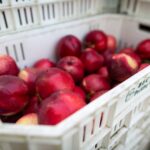California: Port situation 'couldn't have happened at a worse time', says CCM

The California Citrus Mutual (CCM) has said the situation with U.S. West Coast ports has led to fruit 'rotting on the docks', with exports so far this season about a quarter lower than originally forecast.
Contract negotiations between the Pacific Maritime Association (PMA) and the International Longshore and Warehouse Union (ILWU) have been ongoing for several months now, and congestion has become so bad the PMA head said last week the ports were close to a "coast-wide meltdown."
The PMA also temporarily suspended vessel operations over the weekend, saying that "after three months of union slowdowns, it makes no sense to pay extra for less work."
CCM president Joel Nelsen said that last October the organization began warning those in government about the impacts to the US$2.4 billion industry that historically exported 25% of its fresh tonnage.
"That warning manifested into little action," Nelsen said.
"Already we have quantified losing 25% of our opportunity year to date. Fruit is rotting on the docks, sales are being canceled by the customer and our industry has slowed its harvesting so as not to place matured fruit into the market place.
"All this damage is created by two entities that seek to maximize their economic well-being while sacrificing others."
Traditionally, California navel oranges and lemons begin a major push into China, Korea, Japan, Malaysia, Indonesia, Australia, and other smaller countries in late December, with the export season running into April.
The peak volumes are usually seen in the second half of February and into March, after which time they level off somewhat.
CCM director of grower services Dusty Ference told www.freshfruitportal.com that citrus shipments were typically sitting on the docks for 'seven to 10 days', and while exporters were sometimes able to retrieve their cargo, some fruit was being lost.
"Last Friday we did hear our first report of fruit that sat so long it was completely deteriorated and unable to be sold on the market, which means that it essentially became garbage," Ference said.
"We export a substantial amount of fruit, and this is typically our peak season, so this couldn't have happened at a worse time for us."
Ference added while some shippers were focusing more on the domestic market, it could only handle so much fruit before the prices started to tumble.
For the 20012/13 season the industry exported approximately 28 million cartons of navel oranges with an estimated value of US$385million. Lemons rank second with six million cartons exported at US$109 million.
The previous season saw comparable numbers of 28.7 million cartons of navels at US$385 million, and almost identical figures for lemons.
Larger East Coast import volumes
As the situation is West Coast ports continues to worsen, importers are turning more attention to the other side of the country to bring in fruit.
A representative of Kingston Cross Dock and Cold Storage (KCDS) - a major South Florida cold storage and perishables logistics operations - said the company was fortunate to have invested heavily this off-season in the facility and its staff to cope with the extra volumes.
"We were well prepared for the extra expansion in storage demand. It appears the mess out west with the port strike has diverted more perishable cargo into South Florida ports," KCDS general manager Brian Osborne said.
"Demand for cold storage space during this period of time typically exceeds supply and we are receiving many calls for additional space."
The CEO of the parent organization, Kingston Companies, said KCDS had seen a significant increase in interest for cold storage over the last several seasons, but the West Coast port situation had given it an extra boost.
"When an outside factor like the west coast port strike happens, it pushes storage capacity to new heights. Nevertheless, I am proud of our team and how well they've handled the expansion in business," David O. Kingston said.
Photo: www.shutterstock.com














































